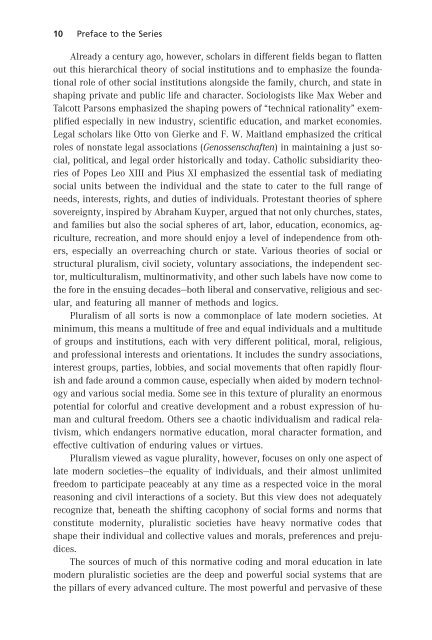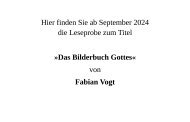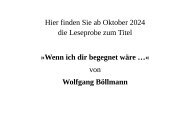Piet Naudé | Michael Welker | John Witte, Jr. (Eds.): The Impact of Political Economy (Leseprobe)
In our late modern pluralistic societies, there are tensions and complementarities between a plurality of individual and social claims and activities to shape societal life and a constructive pluralism of what is known as social systems. The latter provide normative codes and powers emanating from the areas of law, religion, the family, the market, the media, education, academic research, health care, defense and politics. A better understanding and steering of this complex division of powers is crucial for the common good and for freedom and peace. In this volume, a multi-disciplinary team of experts from Germany, Italy, Australia, the UK, the USA, and South Africa bring their conceptual, empirical and historical insights to bear in three broad sections: »The moral dimension of social systems«; »The interaction of religion, law and education with political systems«; and »The moral (mal)-formation evident in case studies on the global financial crisis and social media«.
In our late modern pluralistic societies, there are tensions and complementarities between a plurality of individual and social claims and activities to shape societal life and a constructive pluralism of what is known as social systems. The latter provide normative codes and powers emanating from the areas of law, religion, the family, the market, the media, education, academic research, health care, defense and politics. A better understanding and steering of this complex division of powers is crucial for the common good and for freedom and peace.
In this volume, a multi-disciplinary team of experts from Germany, Italy, Australia, the UK, the USA, and South Africa bring their conceptual, empirical and historical insights to bear in three broad sections: »The moral dimension of social systems«; »The interaction of religion, law and education with political systems«; and »The moral (mal)-formation evident in case studies on the global financial crisis and social media«.
You also want an ePaper? Increase the reach of your titles
YUMPU automatically turns print PDFs into web optimized ePapers that Google loves.
10 Preface to the Series<br />
Already acentury ago, however, scholars in different fields began to flatten<br />
out this hierarchical theory <strong>of</strong> social institutions and to emphasize the foundational<br />
role <strong>of</strong> other social institutions alongside the family, church, and state in<br />
shaping private and public life and character. Sociologists like Max Weber and<br />
Talcott Parsons emphasized the shaping powers <strong>of</strong> “technical rationality” exemplified<br />
especially in new industry, scientific education, and market economies.<br />
Legal scholars like Otto von Gierke and F. W. Maitland emphasized the critical<br />
roles <strong>of</strong> nonstate legal associations (Genossenschaften) inmaintaining ajust social,<br />
political, and legal order historically and today. Catholic subsidiarity theories<br />
<strong>of</strong> Popes Leo XIII and Pius XI emphasized the essential task <strong>of</strong> mediating<br />
social units between the individual and the state to cater to the full range <strong>of</strong><br />
needs, interests, rights, and duties <strong>of</strong> individuals. Protestant theories <strong>of</strong> sphere<br />
sovereignty, inspired by Abraham Kuyper, argued that not only churches,states,<br />
and families but also the social spheres <strong>of</strong>art, labor, education, economics, agriculture,<br />
recreation, and more should enjoy alevel <strong>of</strong> independence from others,<br />
especially an overreaching church or state. Various theories <strong>of</strong> social or<br />
structural pluralism, civil society, voluntary associations, the independent sector,<br />
multiculturalism, multinormativity, and other such labels have now come to<br />
the fore in the ensuingdecades—both liberal and conservative, religious and secular,<br />
and featuring all manner <strong>of</strong> methods and logics.<br />
Pluralism <strong>of</strong> all sorts is now acommonplace <strong>of</strong> late modern societies. At<br />
minimum, this means amultitude <strong>of</strong> free and equal individuals and amultitude<br />
<strong>of</strong> groups and institutions, each with very different political, moral, religious,<br />
and pr<strong>of</strong>essional interests and orientations. It includes the sundry associations,<br />
interest groups, parties, lobbies, and social movements that <strong>of</strong>ten rapidly flourish<br />
and fade around acommon cause, especially when aided by modern technology<br />
and various social media. Some see in this texture <strong>of</strong> plurality an enormous<br />
potential for colorful and creative development and arobust expression <strong>of</strong> human<br />
and cultural freedom. Others see achaotic individualism and radical relativism,<br />
which endangers normative education, moral character formation, and<br />
effective cultivation <strong>of</strong> enduring values or virtues.<br />
Pluralism viewed as vague plurality, however, focuses on only one aspect <strong>of</strong><br />
late modern societies—the equality <strong>of</strong> individuals, and their almost unlimited<br />
freedom to participate peaceably at any time asarespected voice in the moral<br />
reasoning and civil interactions <strong>of</strong> asociety. But this view does not adequately<br />
recognize that, beneath the shifting cacophony <strong>of</strong> social forms and norms that<br />
constitute modernity, pluralistic societies have heavy normative codes that<br />
shape their individual and collective values and morals, preferences and prejudices.<br />
<strong>The</strong> sources <strong>of</strong> much <strong>of</strong> this normative coding and moral education inlate<br />
modern pluralistic societies are the deep and powerful social systems that are<br />
the pillars <strong>of</strong> every advanced culture. <strong>The</strong> most powerful and pervasive <strong>of</strong> these
















